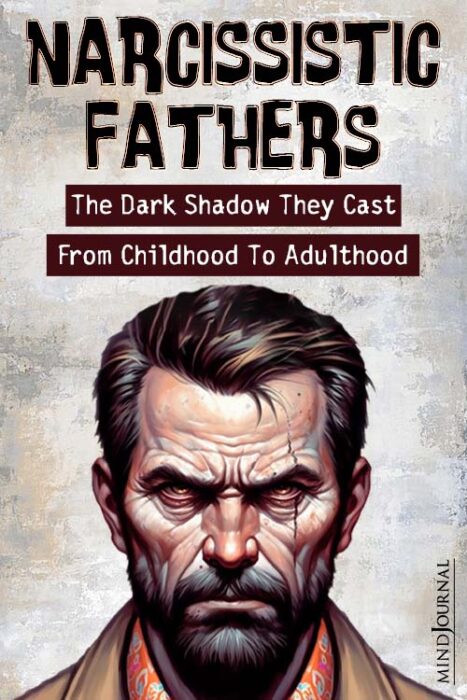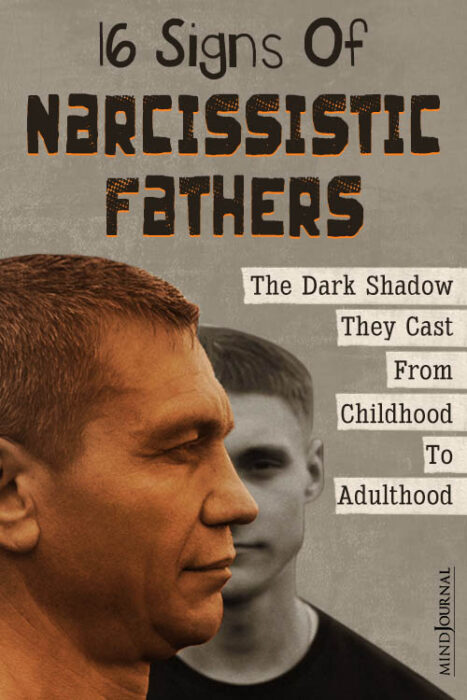Do you live with a toxic, narcissistic father? Is this abusive relationship taking a serious toll on your mental and emotional wellbeing? If you are trying to cope with and recover from an abusive narcissistic father, then you should know that healing is possible.
The relationship we share with our father is one of the most special and strongest bonds in our life. Their personality, attitude and behavior shapes our own personality and mindset. How loving and caring they are may strongly influence our own attachment styles.
This is why most people with “Daddy Issues” often tend to be an emotional mess. When our fathers turns out to be a psychopathic narcissist or an abusive narcissistic father, it can have long-term traumatic effects which can be severely devastating, both mentally and emotionally.
If your dad is a narcissist, then it can adversely affect your adult relationships and negatively impact how you raise your own children.
However, if you have been raised by a narcissistic father, then there are certain things you can do to alleviate the negative effects of a toxic father and live a better life.
Related: Self-Identifying as an Adult Child of Narcissistic Parents
Who Is A Narcissistic Father?
Narcissistic fathers are parents who suffer from narcissistic personality disorder (NPD), which causes an unhealthy craving for attention & admiration, feelings of excessive self-importance and a concerning lack of empathy.
They are highly self-absorbed and have an unrealistic sense of superiority. They tend to be highly manipulative, negative, dictatorial, abusive and self-absorbed. They will always criticize their children unnecessarily and will never accept the blame even when they are wrong.
Prone to lying pathologically, they can be extremely difficult to deal with, particularly because they refuse to see their own faults. A narcissistic father may have a strong need to control how his children see him as they tend to have low self-esteem.
They believe that if they don’t lie, manipulate or control their own children, their insecurities and flaws will get exposed and they will be rejected as a parent. Due to their serious lack of empathy, they are usually incapable of raising children in a healthy way.
An abusive narcissistic father may have toxic attachment patterns and want to fulfil their own dreams through his children. They desperately try to control their children with manipulation, lies, abuse, punishments and even threats.
A narcissistic father can become possessive and abusive with his children as he may feel intimidated by the growth and independence of the children. Not only do they disrespect the personal boundaries of the children, they also tend to have unrealistically high expectations from them.
Their narcissistic behaviors can seriously affect their children’s psychological and emotional growth affecting their attitudes, personalities, reasoning, ethics and morals, attachment styles and social & decision making skills. As a result, the children naturally suffer well into their adulthood.

Signs Of A Narcissistic Father
Narcissistic parents can truly destroy the life of their children. It is a plague that many children are exposed to without having the knowledge of how to cope with it. Children are made to feel that they don’t deserve any love, admiration, approval or respect.
Instead of focusing on children, a narcissistic father only focuses on themselves and in turn blames the children for their own problems and faults.
This is why it is crucial to identify toxic fathers as it is the very first step towards dealing with them and starting your journey towards healing.
Narcissism stems from Narcissistic Personality Disorder (NPD) which is characterized by:
- A lack of empathy
- A strong need for superiority, admiration and validation
- A sense of unrealistic grandiosity
Here are a few common signs which you need to be aware of to realize that your dad is a narcissist:
- They have an exaggerated sense of self-importance and superiority. They are entitled and self-centered.
- They expect to be treated in a special way and want their children to comply with their demands and expectations.
- As they lack empathy, a narcissistic father can be emotionally and physically unavailable and aloof.
- They are disrespectful and constantly criticize their children.
- They love being the center of attention and people are always admiring them due to their charisma.
- One of the major signs of a narcissistic father is that they tend to monopolize and dominate conversations.
- They often tend to lie and exaggerate about things, especially their achievements.
- They are highly demanding and controlling at all times.
- They want their children to be perfect, especially around others. They may even brag about their children but only to make themselves look better.
- They can easily manipulate others to get things their way or take advantage of or exploit others.
- Their love is conditional and is based on their expectations of their children.
- They have anger issues and are highly prone to violent outbursts, screaming and using threats.
- One of the biggest signs of a narcissistic father is that they may struggle with substance abuse problems, whether it’s alcohol or drugs.
- They refuse to accept any criticism about themselves, even if it’s constructive.
- They withhold love, warmth, affection and attention unless it serves their own purpose.
- They don’t want their children to grow up as their children can become independent and mature.
If you have a narcissistic father then they never cared about your needs and emotions. You felt empty, unsatisfied, upset and manipulated. Even as an adult, you don’t feel you are good enough to be loved or deserve to be happy.
Related: 19 Signs You Were Raised By a Narcissistic Mother or Father
Now that we know the signs of a narcissistic father, let’s talk about the impact they have on their children.
How A Narcissistic Father Affects Their Children
There is no doubt that our parents build the foundation based on which we grow and prosper in life. But when your dad is a narcissist, then your sense of self and perception of the world can become seriously skewed.
If you have a narcissistic and toxic parent, then they may believe that you exist solely to meet their needs, demands, wishes and dreams. You are likely to suffer from poor self-esteem and constantly experience shame, guilt and humiliation.
“Being raised by a narcissist gives rise to a belief throughout our lives that we are just not ‘good enough’ despite everything we try and bending over backwards to please others,” explains career and leadership coach Kathy Caprino.
She adds that children with toxic fathers tend to be deeply insecure, overly-sensitive and lack the ability to believe that they are lovable and worthy just as they are. Unfortunately, growing up with narcissism makes them familiar with unhealthy and toxic relationships.
As a result, they unconsciously seek out relationships as adults that are narcissistic and toxic in nature, whether romantically or professionally.
Narcissism is becoming a growing concern for our society. Research shows that 1 out of 16 American adults have experienced clinical narcissism at least once in their lives.
According to psychiatrist and author Mark Banschick, M.D., fathers with NPD adversely affect their own children as they “may disregard boundaries, manipulate their children by withholding affection (until they perform), and neglect to meet their children’s needs because their needs come first.”
As they are overly concerned with image, they often demand perfection from their children. The child grows up in an environment where there is constant pressure to perform, to be better and to fulfil every whim and fancy of their father.
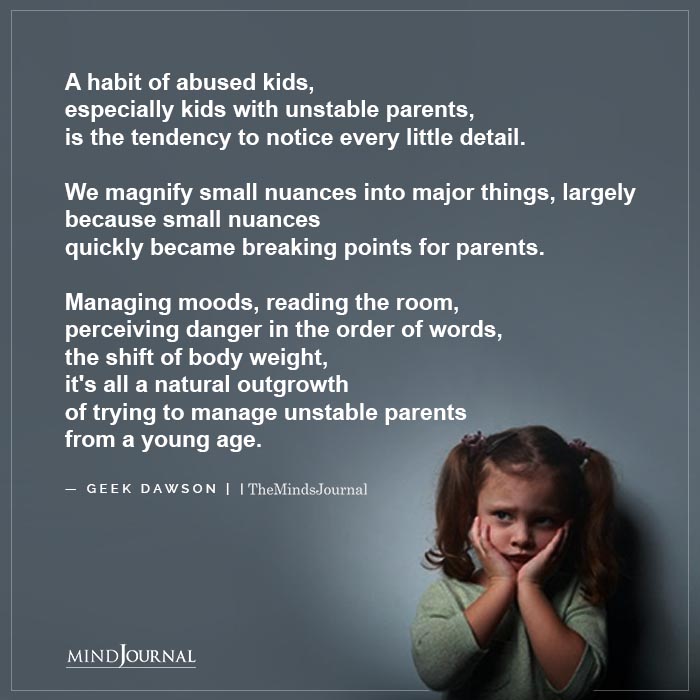
Children with a narcissistic father can become highly successful in life as they tend to be high achievers as a result of growing up with unreasonable expectations from parents. However, due to the constant childhood abuse and trauma, they also tend to self-sabotage their own success.
Moreover, a child with a toxic father may be affected by narcissistic personality disorder (NPD) themselves when they grow up, according to a recent 2020 study. The study states that remembered childhood experiences from mothers and fathers “were associated with higher traits of pathological narcissism in young people.”
Thus, the children of abusive narcissistic fathers continue the loop of toxicity, manipulation and suffering with their own children.
Daughters With “Daddy Issues”
Daughters and fathers share a unique bond that enables them to grow up into confident, independent, responsible and trusting women. However, when fathers abuse their daughters or withhold affection, then it can affect the child’s sense of self worth and self-esteem even in adulthood.
If you are the daughter of a narcissistic father, then it is likely that you have been repeatedly overly criticized, emotionally abused, traumatized and forced to meet ridiculously high standards.
Growing up with a narcissistic father can make daughters question their sense of self, their identity, self-worth and confidence. All the years of insults, humiliations and disapprovals can also lead to mental health issues and self-sabotaging & self-criticizing behaviors. In fact, it can also affect the child’s long term health.
You may strongly doubt your own worthiness, talents, capabilities, potential and appearance. Moreover, you are conditioned to self-sacrifice in adult relationships and being comfortable with toxic romantic partners.
As an adult you attract and look for relationships where you can find the same narcissistic patterns that you experienced in childhood from your father. By reenacting and reliving the same abuse and trauma in your adult relationships, you feel worthy of love and validation.
Unfortunately, such self-sabotaging behavior can lead to the development of severe stress, anxiety disorders, depression, substance use, post-traumatic stress disorder (PTSD) and even suicidal behavior.
Related: 5 Ways Fathers Impact a Daughter’s Romantic Relationships
Psychiatrist Mark Banschick, M.D. explains that daughters with a narcissistic father can feel “unsatiated” as most of their paternal needs are left unmet.
“They never got enough and would have to compete with siblings for time with Dad. You probably carry these concerns into adulthood, even if you found success. With a dad like this, it’s never enough. With men (or women), you often feel vulnerable and worried you’ll be dumped for someone else,” he adds.
You may also develop narcissistic traits to protect yourself.

Sons Who Are Never “Good Enough”
Contrary to popular belief, sons need as much love and admiration from their fathers as daughters. Sadly, when you grow up with a narcissistic father, you start falsely believing that you will never be as good of a man as your father was.
He might have made you feel unimportant or inconsequential. Not only did he avoid showing any warmth and attention, he competed with you instead.
“You may have accepted defeat – you’d never outdo your dad. Or, you may have worked hard to beat Dad at his own game just to get his attention and some semblance of fatherly pride,” adds Mark.
No matter how hard you try or how much you achieve, there’s always an empty void inside.
Toxic fathers can be stubborn and authoritarian. They may be overly strict about the importance of their own opinions and a particular way of getting things done.
Some narcissistic dads may be over-involved and micro-manage their son’s life while some others may be emotionally or physically unavailable being too busy with their own work or pleasures. Being perfectionists, they will never be happy with your progress in life, whether it’s education, career or relationships.
They will make you feel like a burden and will shame and hyper-criticize any flaws or drawbacks that you may have. You may become codependent in case you don’t turn into a narcissist yourself when you grow up.
“Sons of narcissistic fathers are driven by lack of confidence. Raised by a self-centered, competitive, arrogant father, they feel like they can never measure up or are enough to garner their father’s approval,” explains author and therapist Darlene Lancer, JD, MFT.
Traits Of Adult Children With A Narcissistic Father
Your father can cast a long shadow that can engulf you and leave you in the dark longer than you can think. When you have been raised by a narcissistic, toxic dad, it can not only impact your childhood, but also leave lasting emotional and mental scars in your adult life as well.
The abuse and manipulation you are subjected to can not just affect your attitude and mindset, it can also shape your personality. Clinical psychologist and author Craig Malkin, Ph.D. believes that as an adult you can experience the following effects when you are raised by a narcissistic father:
1. Self-blame
Narcissistic dads are emotionally unavailable, selfish and abusive. They are not concerned with what their children are going through or feeling. Unfortunately, as children tend to be sensitive and are dependent on their parents, they compensate their need for love and affection at the cost of their self-esteem.
“Sadly, we often blame ourselves for what’s missing from our lives to preserve a shred of hope,” explains Craig.
As an adult, you will be prone to blaming yourself and feeling responsible for anything that goes wrong around you. Chronic self-blame is a coping strategy that allows you to maintain harmony.
2. Unhealthy attachment
Children with narcissistic fathers tend to develop an insecure attachment style, not just with their parents, but also with their romantic partners once they grow up.
You are unable to experience comfort, closeness and warmth in relationships as you have become used to abuse, manipulation and neglect.
Hence, as an adult you will likely attract narcissistic partners as well. Moreover, you will be codependent and needy in relationships constantly demanding love and attention.
Related: Why Daughters of Narcissists Are Drawn to Narcissistic Men
3. Echoism
Echoism is regarded as the polar opposite of narcissism. Echoist are afraid of attention and worry that others will perceive them as a narcissist. If you were raised by a narcissistic father, then you fear taking away any form of attention from your dad in order to maintain the peace and avoid triggering dear dad.
As an adult, you now work hard to make sure that your father doesn’t have any emotional or angry outbursts.
“If you’re particularly sensitive or empathic by nature, you’re more likely to respond to narcissistic parenting with a stance I call echoism,” writes Craig. He adds “Echoists struggle to have a voice of their own – and often end up with extremely narcissistic partners.”
4. Avoiding needs
If you grew up with a toxic father then you have likely learned to avoid your own needs in order to cater to the needs of your dad.
“Narcissistic parents can make their children terrified of their needs, who bury them by becoming compulsive caretakers or simply falling silent,” explains Craig Malkin Ph.D.
Then something may trigger their repressed needs making them seek immediate and continuous reassurance. This is known as ‘need-panic’.
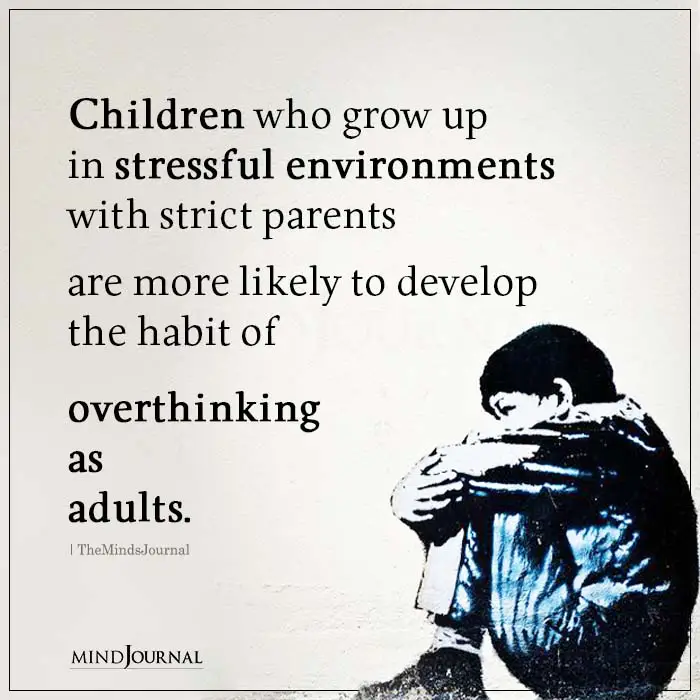
5. Narcissistic personality disorder (NPD)
It is likely that a child raised by a father with narcissism will grow up to be a narcissist themself. The child can often develop NPD traits as a coping mechanism to protect their own self-esteem.
Craig explains “If you’re born with a stubborn, bombastic temperament and exposed to the kind of neglectful or abusive parenting narcissists often provide, you’re more likely to end up narcissistic yourself.”
6. Parentified children
A narcissistic father often raises a frightened child who is afraid of being a burden on others and avoids their own needs.
Instead, they focus primarily on their father’s needs and desires and ensure that daddy’s self-esteem is always boosted. This is especially true for sensitive children or little empaths.
When they grow up, they focus more on others’ happiness rather than their own. They are forced to have the mindset of an adult from an early age.
7. A strong sense of independence
Extroverted children of narcissistic dads may stop relying on others for love and affection and may become aloof and emotionally unavailable themselves.
Conversely, sensitive children may develop ‘Martyr Complex’ and become selfless caretakers. They may believe that only by taking care of others, they can enjoy warmth and intimacy.
8. Post-traumatic stress disorder (PTSD)
PTSD can be a real outcome of being raised by a narcissistic father, especially once you become an adult. Abusive fathers can easily traumatize their own sons and daughters leading to long term stress, anxiety, depression, emotional emptiness and suicidal thoughts.
As an adult you can be terrified of living fully, while staying hypervigilant and avoiding intimacy in romantic relationships.
Let’s explore what to do when it comes to coping with a narcissistic father.
Related: 5 Traits of Children of Narcissistic Parents
Coping with a narcissistic father
Being raised by a narcissistic father can lead to several negative experiences, even after you become an adult.
This is why it is crucial to learn some coping strategies that can help you survive living with an abusive narcissistic father, whether you are still a dependent child or an independent adult.
Here are some self-help strategies when it comes to coping with a narcissistic father.
1. Learn about narcissism
The first step towards healing yourself from abuse from a narcissistic father is educating yourself about narcissism. This will help you realize that narcissistic personality disorder (NPD) is a mental health problem that your father suffers from.
It is not about you or how worthy you are. It never was. It is about them and their personality disorder. By learning about this mental disorder, you will be able to understand, empathize and deal with their toxic behavior.
“The more you educate yourself and find support, the more you will understand what you’ve been through and what you need to do to move beyond the toxic influence of your family,” explains author Julie L. Hall.
2. Set strong boundaries
Establishing personal boundaries is not enough. You need to defend and assert them as well. Narcissists are known for violating boundaries. Your father will try their best to manipulate and control you and will reject your rules just to show their superiority. Instead of giving into their mind games, stand strong and refuse the abuse.
Julie adds “One of the most difficult and important things you must do for yourself as a survivor is to establish healthy boundaries. Understanding what that means and getting comfortable doing it can take considerable time and practice for the child of a narcissist.”
3. Accept that your dad is a narcissist
Despite your best efforts, you will never get the love and admiration you seek from him. So instead of trying to please him or even fix him, simply acknowledge the fact that your father has NPD and that he perhaps always will be a narcissist.
One of the best things you can do when it comes to coping with a narcissistic father is this. Accepting the truth can make things a lot easier for you to navigate through. Instead of holding on to false hopes and letting him manipulate you, take charge of your life and move on.
“If you put him into place in your mind, he may simply end up being a lovable but annoying father. Take the best, as long as he doesn’t still have the power to hurt you,” suggests psychiatrist Mark Banschick, M.D.
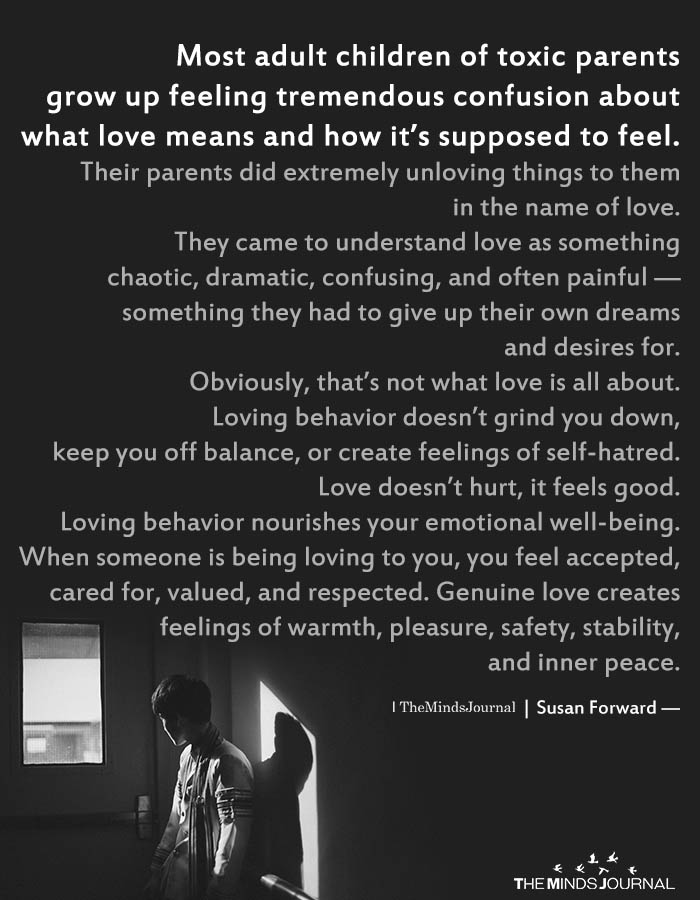
4. Build your self-esteem
As children with a narcissistic father suffer from poor self-esteem, it is important that you work on improving it. Recovering from childhood abuse and adverse experiences necessitates that you practice self-compassion and self-love.
Instead of seeking love and validation from others, learn to love yourself first. Make sure to be kind to yourself, avoid negative self-talk, self-criticism, self-blame and self-hate. These are the things that keep you trapped in the narcissistic loop.
Instead, acknowledge all your negative feelings and be mindful about your thoughts and emotions. Forgive yourself and your father and love yourself unconditionally.
Unless you are compassionate with yourself, you cannot build healthy relationships with others. Develop new thought and behavior patterns and be more positive in your approach towards life.
5. Seek support
Sometimes the emotional and mental scars can run too deep that can last a lifetime. If you feel too stressed, anxious or depressed, or if you believe you are suffering from PTSD or having thoughts about suicide or self-harm, talk to a professional immediately. Narcissistic abuse from childhood can severely affect your mental health.
Hence, it is important that you consult a mental health professional or a therapist to understand your problems and recover from them. A therapist can help you overcome childhood trauma and learn how to build healthier relationships.
Related: Escaping the Cycle of Suffering: Why You Should Forgive Your Parents
6. Leave if you need to
Just because your father is a narcissist, it doesn’t necessarily mean you have to tolerate their abuse. Once you have spoken to your therapist, you can decide whether you should cut all ties with your dad to protect yourself.
This can be especially important if your father abuses you physically. So do not hesitate to leave if you feel unsafe around them.
Mark Banschick, M.D. suggests “Cut ties if it is too toxic or dangerous. Some narcissistic parents have violent or abusive tendencies. It goes along with their self-righteousness. You are now an adult. Take care and take caution.”
Focus on the positive
Growing up with a narcissistic father who is manipulative, abusive and unavailable can be undoubtedly difficult for any child. However, not all adults in your family are toxic.
Whether it’s your mother, grandparents, uncles, aunts, cousins, teachers or coaches, there are good people around you who love, appreciate and admire you.
So instead of focusing on all the toxicity around you that comes from your dad, appreciate all the love you receive from others. But most of all you need to realize the love and value you have for yourself.
You don’t need to be more. You don’t need to be perfect. You can be flawed and still deserve to be loved. You can be imperfect and still deserve to be happy. Your thoughts and emotions matter. And don’t let anyone else tell you otherwise.

